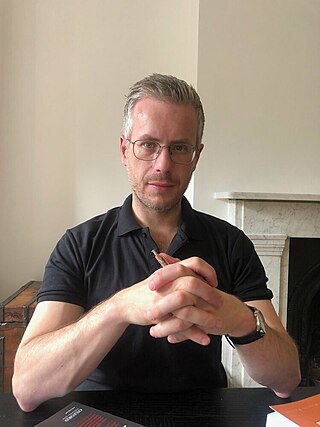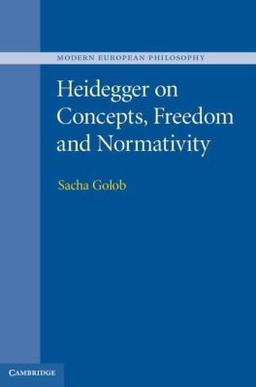
Ernst Alfred Cassirer was a German philosopher. Trained within the Neo-Kantian Marburg School, he initially followed his mentor Hermann Cohen in attempting to supply an idealistic philosophy of science.
Espen Hammer is Professor of Philosophy at Temple University. Focusing on modern European thought from Kant and Hegel to Adorno and Heidegger, Hammer’s research includes critical theory, Wittgenstein and ordinary language philosophy, phenomenology, German idealism, social and political theory, and aesthetics. He has also written widely on the philosophy of literature and taken a special interest in the question of temporality.
Michael Friedman is an American philosopher who serves as Professor of Philosophy and the Frederick P. Rehmus Family Professor of Humanities at Stanford University. Friedman is best known for his work in the philosophy of science, especially on scientific explanation and the philosophy of physics, and for his historical work on Immanuel Kant. Friedman has also done historical work on figures in continental philosophy such as Martin Heidegger and Ernst Cassirer. Friedman also serves as the co-director of the Program in History and Philosophy of Science and Technology at Stanford University.
Jay M. Bernstein is an American philosopher, and University Distinguished Professor at The New School. He received a BA from Trinity College in 1970 and graduated from the University of Edinburgh with a PhD in 1975, presenting the thesis "Kant and transcendental realism".
Peter Eli Gordon is a historian of philosophy, a critical theorist, and intellectual historian. The Amabel B. James Professor of History at Harvard University, Gordon focuses on continental philosophy and modern German and French thought, with particular emphasis on the German philosophers Theodor Adorno and Martin Heidegger, critical theory, continental philosophy during the interwar crisis, and most recently, secularization and social thought in the 20th century.
Patricia W. Kitcher is the Roberta and William Campbell Professor of Philosophy at Columbia University, widely known for her work on Immanuel Kant and on philosophy of psychology. She has held many positions at different universities, is a founding chair of a committee at the University of California, and has a lead role in multiple professional organizations. Kitcher's most notable interests throughout her career regard cognition and Kantian ethics. She is the author of multiple papers and two books.
The following is a list of the major events in the history of German idealism, along with related historical events.

In 1929 Ernst Cassirer took part in a historically significant encounter with Martin Heidegger in Davos during the Second Davos Hochschulkurs,. Cassirer argues that while Kant's Critique of Pure Reason emphasizes human temporality and finitude, he also sought to situate human cognition within a broader conception of humanity. Cassirer challenges Heidegger's relativism by invoking the universal validity of truths discovered by the exact and moral sciences.
Rachel Elizabeth Zuckert is an American philosopher and professor of philosophy at the Northwestern University. She is known for her expertise on Kantian philosophy. Zuckert is a former president of North American Kant Society.
Oliver Sensen is a German philosopher and associate professor of Philosophy at Tulane University. He is known for his expertise on Kantian philosophy. Sensen is the vice-president of North American Kant Society.

Heidegger, Strauss, and the Premises of Philosophy: On Original Forgetting is a book by Richard Velkley, in which the author examines the philosophical relationship between Martin Heidegger and Leo Strauss. It has been translated into French and Chinese.
Chad Anthony Engelland is an American philosopher and Professor of Philosophy at the University of Dallas. He is known for his research on the ideas of German philosopher Martin Heidegger. Engelland is a former editor-in-chief of Xavier Newswire (1998–1999).
Frank Schalow is an American philosopher and professor of philosophy and university research professor at the University of New Orleans. He is known for his exegesis of Martin Heidegger's writings. He is a co-editor of, the journal Heidegger Studies.

Sacha Yevgeny Golob is a British philosopher and a Reader in the Department of Philosophy at King's College London. Golob is known for his expertise on French and German philosophy, in particular the work of Immanuel Kant and Martin Heidegger.

Heidegger on Concepts, Freedom, and Normativity is a 2014 book by the philosopher Sacha Golob, in which the author provides an account of the arguments and concepts characterizing the philosopher Martin Heidegger's early thought and examines their positions both in contemporary analytic philosophy and the history of philosophy. He argues against existing interpretations of Heidegger on intentionality and believes that Heidegger emphasizes a unique position regarding conceptual and representational content.
Miguel de Beistegui is a continental philosopher and Professor of Philosophy at the University of Warwick. He is known for his expertise on Heidegger's thought.
Daniela Vallega-Neu is a German philosopher and Professor of Philosophy at the University of Oregon. She is known for her expertise on hermeneutics, deconstruction and Heidegger's thought.
Jens Timmermann is a German philosopher and the Professor of Moral Philosophy at the University of St Andrews. He is best known for his research on Kant’s ethics, political philosophy and philosophy of law.
Lara Denis is an American philosopher and Professor of Philosophy and Director of Ethics Program at Agnes Scott College. She is known for her works on Kantian ethics. Denis is a former President of Phi Beta Kappa (2007-2008).
Richard Eldridge is an American philosopher and the Charles and Harriett Cox McDowell Professor Emeritus of Philosophy at Swarthmore College. He is known for his works on philosophy of art.




